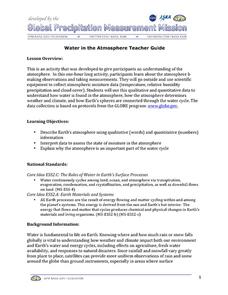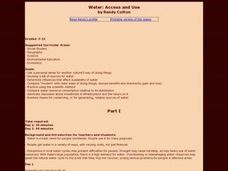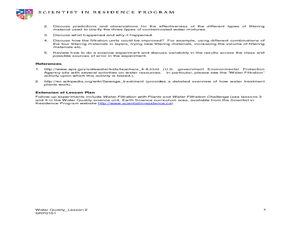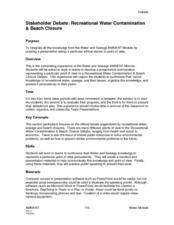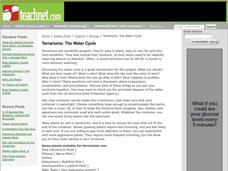Centers for Ocean Sciences
Ocean and Great Lakes Literacy: Principle 1
Is your current lesson plan for salt and freshwater literacy leaving you high and dry? If so, dive into part one of a seven-part series that explores the physical features of Earth's salt and freshwater sources. Junior hydrologists...
American Chemical Society
Temperature Affects Density
Different substances can have different densities, but can the same substance have different densities? Lesson explores the effect of temperature on the density of water. Extension idea connects the concept of how melting ice in lakes...
Curated OER
Barrels and Buckets: Access to Water - What Would It Be Like to Live in Africa?
Learners compare water access in the United States with that of Africa. In this water access lesson, students located Ghana and Kenya on a globe before reading Peace Corps Volunteer accounts of the difficulty of accessing clean water....
Curated OER
Water Filtration
As an example of nature's water filtering system, young ecologists conduct an experiment in the lab. They construct a funnel out of a plastic bottle, fill it with specified layers of materials that simulate layers of soil, then run muddy...
Curated OER
Water in the Atmosphere
A slide show serves as the backdrop for a lesson on the moisture in Earth's atmosphere. Through it, mini meteorologists learn about the attributes of the atmosphere and actually use data-collecting weather tools to make observations and...
Curated OER
Like Water for Chocolate: How-to Narrative Essay
Connect Laura Esquivel's Like Water for Chocolate to student experience with this how-to narrative essay. Writers weave the instructions from their own family recipe into a narrative using sensory details. This assignment sheet includes...
San Francisco Public Utilities Commission
Hetch Hetchy: The Story of San Francisco's Water
How did San Francisco supply enough water for its residents over the last two centuries? Learn about droughts and water conservation in California, as well as specific historical events that led to the water system today. Kids read two...
San Francisco Public Utilities Commission
What is Drought? No Rain, No Water
How can climate change affect our water supply? Have kids read a passage about the water cycle and water conservation, which includes six questions that challenge them to use context clues.
PBL Pathways
Arsenic and Selenium Removal From Drinking Water at a Minimal Cost
Decide on the most efficient plan to supply drinking water. The second project-based learning task in a two-part series builds upon the first project. Pupils revisit the wells to supply drinking water, but they must make sure the...
Salt River Project
How Do We Clean Polluted Water?
How do we clean up oil spills and other pollutants in the water? Explore water treatment strategies with a set of environmental science experiments. Groups remove oil from water, work with wastewater treatment, and perform a water...
Discovery Education
Smoke on the Water
How do clouds form? Learners demonstrate the formation of clouds and the water cycle by testing four different setups in a plastic bottle. They identify the key components of a cloud to help them understand the process of cloud...
Curated OER
Model of a Well
Learners complete an experiment using wire screening, wires, water, sand, and food coloring to compare the relationship of groundwater to wells. In this water lesson plan, students observe and record what they see after they complete the...
Curated OER
Water: Access and Use
Students get a personal sense for another culture's way of doing things. Develop a list of sources for water. Practice using the scientific method. Examine means for conserving, or for generating, reliable sources of water.
Curated OER
"Water Has Many Uses" Mini-unit
Learners understand the importance of water as a resource in our lives. In this water mini-unit students recognize that not all countries have water available as we do. Learners discuss and explain a plan for responsibilities of getting...
Curated OER
Water Pollution Prevention and Conservation
Students examine how to conserve water. They also discover how to prevent water pollution. They examine the Earth's water distribution as well.
Curated OER
Water Quality: Water Filtration
Students build a water filtration system. In this water quality lesson, students work in groups to construct water filtration units that can purify contaminated water. This lesson is part of a larger unit on water quality.
Curated OER
Water
Young scholars learn about the history of Indiana's water and understand how easily pollution can contaminate the water supply. They also learn how little fresh water we have and how important it is to protect it.
Curated OER
Healthy Water!?
Middle schoolers test water for its quality and record their information.In this water quality lesson, students investigate water for pH, macro invertebrates and identify its characteristics. Middle schoolers complete worksheets on their...
Curated OER
Recreational Water Contamination and Beach Closurew
Learners work in teams to develop a presentation and handout representing a particular point of view in a recreational Water Contaminationand Beach Closure Debate. They synthesize their knowledge of recreational water, sewage, and their...
Curated OER
The Water Cycle
Students create terrariums in containers in order to study the Water Cycle. They examine how the terrarium maintains life in the closed environment.
Curated OER
Earth's Water
If the majority of our planet is covered with water, why do we need to bother conserving it? With a thorough and varied investigation into the location and types of water on the earth, learners will gain an understanding of why this...
University of Wisconsin
Infiltration Test: Exploring the Flow of Water Through Soils
Soil scientists gain experience with an infiltrometer can to determine the infiltration rates at different locations on campus. If you are using the entire unit, the class has already analyzed water flow and soil types, so they should...
Foundation for Water & Energy Education
How is Flowing Water an Energy Source? Activity C
Can the force of falling water through a tube vary by altering the diameter of the tube or its height? That is what physical scientists aim to discover in this activity, the third in successively more revealing activities on the power of...
Nuffield Foundation
Measuring Rate of Water Uptake by a Plant Shoot Using a Potometer
How quickly does a plant transpire? Learners explore this question through measuring water uptake with a potometer. They time the movement of a bubble a set distance to understand the motion and rate of speed.






